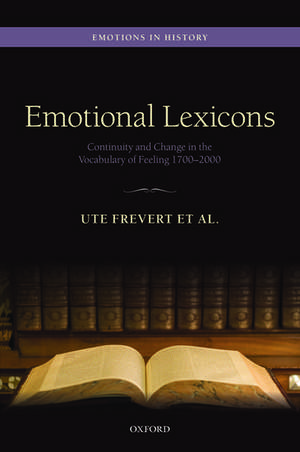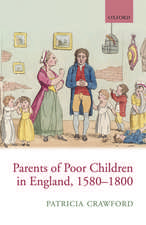Emotional Lexicons: Continuity and Change in the Vocabulary of Feeling 1700-2000: Emotions In History
Autor Ute Frevert, Christian Bailey, Pascal Eitler, Benno Gammerl, Bettina Hitzer, Margrit Pernau, Monique Scheer, Anne Schmidt, Nina Verheyenen Limba Engleză Hardback – 13 feb 2014
Preț: 775.35 lei
Preț vechi: 1113.82 lei
-30% Nou
Puncte Express: 1163
Preț estimativ în valută:
148.36€ • 155.32$ • 122.76£
148.36€ • 155.32$ • 122.76£
Carte tipărită la comandă
Livrare economică 25-31 martie
Preluare comenzi: 021 569.72.76
Specificații
ISBN-13: 9780199655731
ISBN-10: 0199655731
Pagini: 300
Dimensiuni: 163 x 241 x 25 mm
Greutate: 0.61 kg
Editura: OUP OXFORD
Colecția OUP Oxford
Seria Emotions In History
Locul publicării:Oxford, United Kingdom
ISBN-10: 0199655731
Pagini: 300
Dimensiuni: 163 x 241 x 25 mm
Greutate: 0.61 kg
Editura: OUP OXFORD
Colecția OUP Oxford
Seria Emotions In History
Locul publicării:Oxford, United Kingdom
Recenzii
a comprehensive, rigorously compiled and wide-ranging set of resources for anyone interested in how emotions are described and conveyed.
Emotional Lexicons is as impressive a project as its title implies. Positioning itself as merely a building block towards the eventual aim, this book makes a good case for further interdisciplinary research into emotion.
Emotional Lexicons is an innovate collection, the strength of which lies in the many angles from which it approaches a lexical study of the history of emotions in modernity.
Emotional Lexicons is as impressive a project as its title implies. Positioning itself as merely a building block towards the eventual aim, this book makes a good case for further interdisciplinary research into emotion.
Emotional Lexicons is an innovate collection, the strength of which lies in the many angles from which it approaches a lexical study of the history of emotions in modernity.
Notă biografică
Ute Frevert is Director at the Max Planck Institute for Human Development and a Scientific Member of the Max Planck Society. From 2003 to 2007 she was professor of German history at Yale University and previously taught History at the Universities of Konstanz, Bielefeld, and the Free University in Berlin. Her research interests include the social and cultural history of the modern period, the history of emotions, gender history, and political history. Some of her best known work has examined the history of women and gender relations in modern Germany, social and medical politics in the nineteenth century, and the impact of military conscription from 1814 to the present day. Ute Frevert is an honorary professor at the Free University in Berlin and member of several scientific advisory boards. In 1998 she was awarded the prestigious Leibniz Prize.














